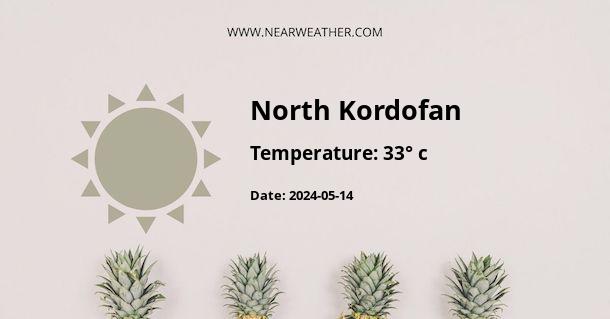Climate and Weather in Northern Kordofan State, Sudan
Northern Kordofan State, located in Sudan, experiences a semi-arid climate with distinct wet and dry seasons. The weather in this region is influenced by its geographical location and the prevailing winds. Understanding the climate and weather patterns in Northern Kordofan State is crucial for residents, tourists, and agricultural activities in the area.
Geographical Location
Northern Kordofan State is situated in central Sudan, bordering South Sudan to the south. It lies between latitudes 12°30'N and 14°30'N and longitudes 29°E and 32°E. The state is characterized by vast plains, scattered hills, and the presence of the Nuba Mountains in the southeastern part.
Temperature
The climate in Northern Kordofan State is hot and dry for most of the year, with high temperatures recorded throughout. The average annual temperature in the region is around 30°C (86°F). However, during the hottest months, from April to June, temperatures can soar above 40°C (104°F).
During the cooler months, from November to February, temperatures range between 20°C (68°F) and 30°C (86°F). These months are considered the most pleasant for outdoor activities and tourism in the region.
Rainfall
Northern Kordofan State experiences a distinct wet and dry season, with the majority of the rainfall occurring between June and September. The average annual rainfall in the region is approximately 400-600 mm (15.7-23.6 inches).
During the wet season, the region experiences occasional heavy downpours and thunderstorms. These rains are essential for agriculture and contribute to the growth of crops, particularly sorghum, millet, and peanuts, which are major crops in the area.
Dry Season
The dry season in Northern Kordofan State extends from October to May, with minimal or no rainfall. This period is characterized by hot, dusty winds, and low humidity levels. The average relative humidity during the dry season is around 25-35%, contributing to the arid conditions.
The dry season poses challenges to agriculture and water availability in the region. Irrigation systems and water management are crucial during this period to sustain both agricultural activities and the local population.
Wind Patterns
The prevailing winds in Northern Kordofan State are the Harmattan winds, which blow from the northeast during the dry season. These winds carry dry and dusty air from the Sahara Desert, resulting in reduced visibility and increased levels of airborne dust particles.
During the wet season, the winds shift to the southwest, bringing moisture from the tropical Atlantic Ocean. These winds contribute to the formation of thunderstorms and the delivery of rainfall to the region.
Climate Change
Like many other regions around the world, Northern Kordofan State is also experiencing the impacts of climate change. The increasing temperatures, changing rainfall patterns, and prolonged dry spells pose significant challenges to agriculture, water resources, and the overall ecosystem of the region.
Adaptation strategies, such as the implementation of sustainable agricultural practices, water conservation measures, and climate-resilient infrastructure, are crucial in mitigating the effects of climate change in Northern Kordofan State.
Conclusion
Northern Kordofan State in Sudan experiences a semi-arid climate characterized by hot and dry conditions for most of the year. The region has distinct wet and dry seasons, with the majority of the rainfall occurring between June and September. The dry season, from October to May, poses challenges to agriculture and water availability. Understanding the climate and weather patterns in Northern Kordofan State is essential for residents, tourists, and sustainable development in the region.
A - North Kordofan's Latitude is 14.500000 & Longitude is 29.500000.
A - Weather in North Kordofan is 23° today.
A - Climate Conditions in North Kordofan shows scattered clouds today.
A - Humidity in North Kordofan is 15% today.
A - Wind speed in North Kordofan is 25.52 km/h, flowing at 9° wind direction. today.
